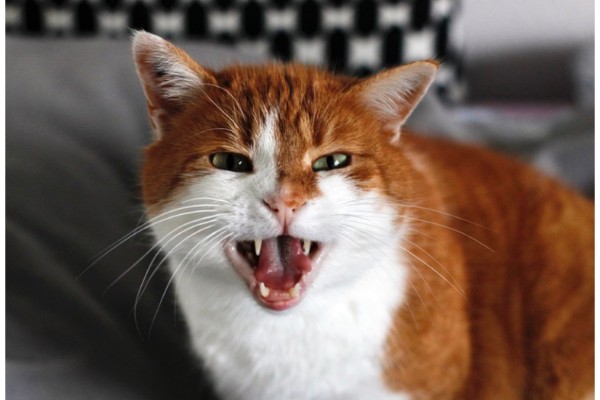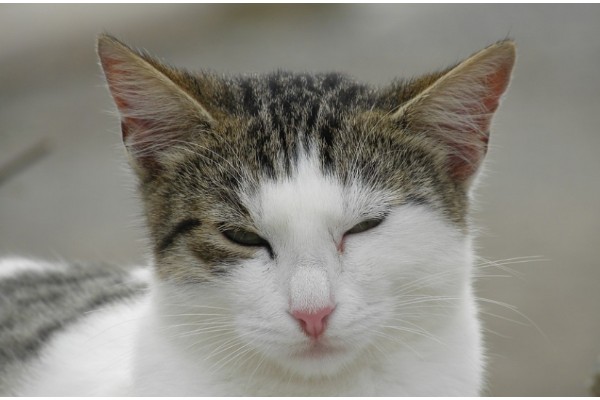Cats typically don’t hold a grudge for very long. Your cats would return to you after a short while, all cuddly and loving. However, your cat will take longer to forgive you once traumatic events occur.
Table of Contents
Do Cats Hold A Grudge?
Your cat may keep their distance for a few days if you trip over its tail or step on it while stumbling to the refrigerator in the middle of the night. This may give you the impression that your cat has something against you, but is this really the case?
Although cats sometimes act in ways that suggest they have a grudge, their true motivations probably differ greatly from how we humans feel when we’re accused of harboring resentment.
In a human context, a grudge is a long-standing feeling of resentment or anger toward another person. It’s unlikely that this is what drives our cats to ignore us when we approach them.
If you tripped over your cat last night and they are avoiding you today, this behavior is likely less a sign of resentment than it is a sign that your cat wants to prevent getting hurt or tripped over again. Grudge-like behaviors in cats are more frequently brought on by anxiety or fear than by anger or resentment.
How Long Do Cats Hold A Grudge?
The length of time a cat harbors anger is significantly influenced by age. Older cats tend to hold grudges for a longer period of time, whereas kittens tend to have a shorter memory.
In contrast to dogs, who have a memory span of only five minutes, cats have a 16-hour memory. As a result, cats may remain angry for up to 16 hours, but typically, it takes them a few hours to forget and forgive.
The time it takes for them to return to their lovely and loving state varies from time to time.
This might occur if you trip over them or step on their tail unintentionally, or if they go through any traumatic experiences.
The opposite is true, despite the fact that you might assume they are being grumpy and avoidant out of malice.
Cats remember traumatic events
Cats typically forget things quickly, but if they continue to avoid you, they’re probably anxious and only trying to protect themselves and stop the traumatic event from happening again.
Cats relate people and things to either pleasant or unpleasant experiences. They would therefore approach you or avoid you depending on how you have interacted with them in the past.

Things That Your Cat May Forgive Within A Day
You never know what would make a cat angry or how long it would take them to forgive you because cats are unpredictable.
Additionally, because each cat is unique, it may react to anger in different ways and forgive more quickly or more slowly.
Below are common behavior cats usually forgive quickly:
The forced and overwhelming attention
You might believe that overly petting and cuddling your cat will make her feel loved and appreciated, but in actuality, it could overwhelm her and make her angry.
Keep your distance if you notice that your cat is avoiding you because she needs her own time and space just like you do.
Don’t ignore her completely though. She will typically come back to you within a day if she is upset with you because you gave her too much attention.
You lifted her up
It may even be frightening to cats, who detest being lifted. Allow your cat to choose how she wants to interact with you.
Your cat might feel constrained as a result of being lifted because she is unable to move around freely. She might initially try to avoid you, but she’d soon learn to put up with you.
Interesting READ What Does It Mean When A Cat Wags Its Tail?
Nevertheless, it might take longer for your cat to get used to you if she had an unpleasant experience and connected it to being lifted.
You hit her unintentionally
Your cat may need about a day to forget and forgive you if you hit her unintentionally. If it doesn’t happen often, your cat will understand that it was just an accident and that you didn’t mean to hurt her.
Other things your cat may forgive within a day
It might take a day for your cat to approach you again if you woke her up and interrupted her deep sleep. Allow your cat to rest as much as she requires if you care about her.
Cats detest it when you touch their tender spots, like the belly or paw pads. If you continue to touch her after she rejects you and you don’t get the hint, she might avoid you all day.

Horrible Things That Your Cat Won’t Forgive You For A Few Days
If it takes your cat longer than a day to forgive you, the incident and abusive behavior must have been extremely traumatic and severe.
Punishing your cat
Even if your cat is excessively agitated and noisy, hold off on punishing her. She might categorize the punishment as a bad experience that would require her days to get over.
Your cat might feel mistreated if you yell at her or clap loudly at her as punishment, and she might avoid you for a few days until she feels safe once more.
Stepping on her tail
Even accidentally stepping on your cat’s tail may take her a few days to get used to.
Even though she may be aware that it was only a one-time occurrence, your cat still felt threatened and injured and needs some time to get over the trauma so she can once again associate you with affection.
Be kind to her while allowing her some space. She will soon get back to normal if you give her a few treats.
Recurring abuse
Any type of persistent mistreatment can cause your cat to avoid you for days. If your cat associates even a seemingly harmless action, like clapping or speaking louder, with punishment or unpleasant feelings, it may be abusive.
5 Signs Your Cat Is Still Angry At You

Here are some signs your cat may display if she’s still angry at you:
They’re avoiding you
The most obvious and revealing behavior is when your cat begins to avoid you.
Cats will flee the room or hide under your furniture when they’re upset with their owners and refuse to come out even if you keep calling for them.
Some cats, however, are further away and may take a while to approach you. If your cat has a reputation for being reserved, watch to see if they wait longer than usual to approach you.
Changes in eating behavior
The next common action cats take when they’re upset is to reject their favorite food or even to stop eating altogether.
The signature look
Cats’ well-known razor-sharp expression is another telltale sign of their anger.
Even if you don’t own a cat, you’ve probably come across an irritated cat online or in passing in real life, and you’re familiar with that unsettling yet endearing expression she has.
READ Why Is My Newborn Kitten Panting to learn more. (6 causes!)
They make messes everywhere
If your cat starts urinating or defecating on your fresh sheets, clean bed, or clean pillows, even though you are sure they are all in good health and cleanliness, this could be a direct indication of how angry they are. They might even bite you occasionally!
Do not worry, however, as it is unlikely to occur.
Subtle signs
The aforementioned indicators are clear-cut and simple to see, but your cat may also exhibit other, more subtle indicators of anger. These mainly relate to their physical characteristics.
Cats twitching their tails are the first subtle but alarming sign. Before your cat’s rage finally dissipates, you will need to observe its back and forth motion for a while.
Have you ever noticed that occasionally, as your cat crouchs with her back arched, she gets fluffier, bigger, and more intimidating? Although you might think it’s cute, your cat is actually acting aggressively there.
Cats’ ears flatten tightly to the head, resembling airplane wings, which is another subtle physical manifestation of their anger.
As part of their defensive mode, they also experience fear when they perceive a threat.
As is common knowledge, cats purr when they are relaxed, content, and enjoying affection. The anger they are expressing, though, may also be expressed in other ways.
How To Apologize To Your Cat
If your cat has just entered her anger phase, give her some time alone. Your attempts to pet her will only make matters worse and make you angry yourself. She will continue to avoid you.
Therefore, you must play it wisely and subtly.
Sit where your cat can see you. If your cat has a favorite blanket, pillow, toy, or another item, bring it closer to you without going near her.
They may do so voluntarily if they do. At mealtime, prepare their favorite foods while attempting to maintain a safe distance from her.
Try to approach your cat cautiously after giving her some space. By this point, she might be responding favorably.
Cats, after all, detest being ignored, and they may even become angrier if you do so for an extended period of time. Try speaking to your cat without getting too close if she’s still off-limits.
Without being overly raucous and without sounding superior, address her by name. Cats typically respond best to their names. Try playing with your cat while a toy is hanging from a string as she responds.
By now, your cat has hopefully returned to her affectionate and loving self.

How To Prevent Your Cat From Developing Negative Associations
The best way to prevent an “oops” moment with your cat is to pay close attention to the physical cues he’s giving you.
“Learn cat body language so that you can tell if they are scared or irritated with what you are doing,” Dr. Delgado said.
Your cat’s body language will let you know which things make him uncomfortable before it becomes too scary. And you can respect his boundaries if you can recognize those signs.
“If your cat does not like being held, you should not keep trying to hold them,” Dr. Delgado said. “Respect your cat’s preferences if they exist regarding the location of the pet session.”
Body language that means your cat may be scared includes:
- Arched back
- Raised tail
- Hiding
- Teeth showing
- Hissing
- Ears flicking back and forth
- Dilated pupils
- Crouching
- Tense body
- Their Tail curled around his body
Give your cat some space if you see any of these symptoms; this will help keep his fear from getting worse.
“Cats are often stressed when they don’t feel they have choices — to get away, to control the pace of an interaction, to take their time getting to know someone,” Dr. Delgado said.
A young age of socialization will also help your cat avoid having unfavorable associations with you.
“Those experiences are important in helping cats feel comfortable later in life,” Dr. Delgado said. “A cat that was not exposed to a variety of people early in life might later become warier of strangers and require more time to get used to changes.”
Therefore, keep in mind that your cat is not harboring resentment if he is upset about something. By providing him with his favorite treats and toys, you can try to change those negative associations into positive ones.
Observe his body language as well to ensure that you don’t say or do anything that would frighten or unnerve him. (Additionally, always pay attention to your step.)
